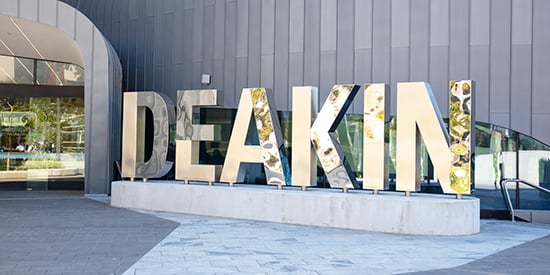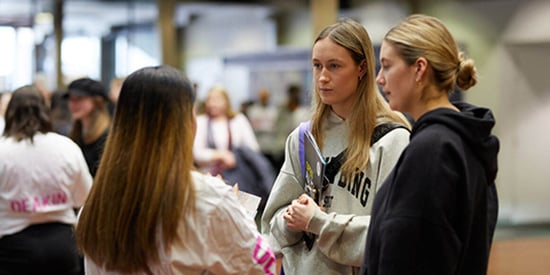Key facts
Key dates
Direct applications to Deakin for Trimester 2 2024 close 23 June 2024
Direct applications to Deakin for Trimester 3 2024 close 27 October 2024
Current Deakin Students
To access your official course details for the year you started your degree, please visit the handbook
Course overview
Study people's behaviour, their cognitive processes, and the factors that influence all of us to think and act in different ways.
The Bachelor of Arts (Psychology) requires students to combine research with professional study, and draws on subjects from both liberal and creative arts.
As a student of this course, you’ll study psychology as a scientific discipline and appreciate the important role it plays within society. Some of the areas you’ll learn about include behavioural and clinical neuroscience, child and adolescent psychology, relationships and the psychology of groups, cognitive psychology, forensic psychology, and psychopathology. You’ll also explore selected arts, social science and humanities disciplines.
This course is perfect for empathetic people who are passionate, understanding people who wish to better understand themselves and those around them.
Read MoreCourse information
- Award granted
- Bachelor of Arts (Psychology)
- Year
- 2018 course information
- Deakin code
- A301
- CRICOS code?
- 077384J Burwood (Melbourne), Waurn Ponds (Geelong)
- Approval status
- This course is approved by the University under the Higher Education Standards Framework.
- Australian Qualifications Framework (AQF) recognition
The award conferred upon completion is recognised in the Australian Qualifications Framework at Level 7.
Course structure
To qualify for the Bachelor of Arts (Psychology), a student must successfully complete 24 credit points of study including:
- 10 credit points of Psychology units including the approved 10-credit-point Psychology major sequence
- 10 credit points of Arts units including an approved Arts major sequence of at least 8 credit points.
- 4 electives credit points from units offered by either Faculty or by another Faculty
- no more than 10 credit points at Level 1
- a minimum 4 credit points at level 3
- AAI018 Academic Integrity (0-credit-point compulsory unit)
Intakes by location
The availability of a course varies across locations and intakes. This means that a course offered in Trimester 1 may not be offered in the same location for Trimester 2 or 3. Check each intake for up-to-date information on when and where you can commence your studies.
Deakin splits the academic year into three terms, known as trimesters. Most students usually undertake two trimesters each year (March-June, July-November).
Aboriginal and Torres Strait Islander students can apply directly through the NIKERI Institute.
Additional course information
Transition to University study
The faculty offers two units AIX160 Introduction to University Study and AIX117 Professional Writing for Work, that are specifically designed to ease the transition into university study. New students are encouraged to enrol in one or both of these units in their first year.
Assessment
Assessment within the award of Bachelor of Arts (Psychology) varies from written assignments and examination to practical and technical exercises and performance. In some units assessment may also include class participation, online exercises, seminar exercises, and tests.
Refer to A300 Bachelor of Arts handbook course entry for list of Arts majors on offer.
Course duration - additional information
Course duration may be affected by delays in completing course requirements, such as accessing or completing work placements.
Mandatory student checks
Any unit which contains work integrated learning, a community placement or interaction with the community may require a police check, Working with Children Check or other check.
Participation requirements
Reasonable adjustments to participation and other course requirements will be made for students with a disability. Click here for more information.
Work experience
Elective units may provide the opportunity for Work Integrated Learning experiences.
Need help?
Ask a question about studying at Deakin
Entry requirements
Scholarship options
A Deakin scholarship could help you pay for your course fees, living costs and study materials. If you've got something special to offer Deakin - or maybe you just need a bit of extra support - we've got a scholarship opportunity for you. Search or browse through our scholarships
Apply now
Applications for Trimester 1, 2025 open in August. Each year, thousands of students prepare for uni with the help of Deakin support services. We offer a huge range of support, including one-on-one consultations, webinars, online resources and events throughout the year.
Some of our courses have limited places available - for the latest on courses still open for application, visit Courses by trimester.
Create an account in the Deakin Application Portal, start your application, enter personal details, education experience, upload supporting documents and submit. Need help? Play this video, or contact one of our friendly future student advisers on 1800 693 888 or submit an online enquiry.
Courses at Deakin are flexible and culturally inclusive. Explore the various ways you can apply to study this course - including through the NIKERI Institute and via the Indigenous Access Scheme.
Entry pathways
View pathways into the Bachelor of Arts (Psychology) with our pathways finder.
Contact information
Arts and Education Student Services and Enrolment Enquiries
Waurn Ponds (Geelong)
Tel 03 5227 1359
artsed@deakin.edu.au
Burwood (Melbourne)
Tel 03 9246 8100
artsed@deakin.edu.au
Cloud (online)
Tel 03 5227 1359
artsed@deakin.edu.au
Careers
Want a degree that’s more than just a qualification? Our industry connections, world-class facilities and practical approach to learning are just some of the reasons why Deakin students graduate confident and ready to thrive in the jobs of tomorrow.
Career outcomes
As a Deakin Bachelor of Arts (Psychology) graduate you will develop some of the most important skills a student can gain at university. You will become expert at managing knowledge and communicating information, and develop skills of critical analysis and systematic thinking.
Graduates of this course will be well placed to enter a variety of employment fields after a combination of a broad range of specialised and general skills, often demanded by today's employers. Some of these fields include psychology, media and communication, photography, politics and policy studies, history, languages and visual arts. The broad range of major sequence options ensures that graduates have the opportunity to gain qualifications in a number of areas.
On completion of this degree, you may choose to undertake an honours degree or postgraduate study. These studies normally provide professional qualifications directed to a particular career.
For more information go to DeakinTALENT
Professional recognition
Deakin's Bachelor of Arts (Psychology) is accredited by the Australian Psychology Accreditation Council (APAC) and enables you to undertake additional study in pursuit of professional registration.
Course learning outcomes
Deakin's graduate learning outcomes describe the knowledge and capabilities graduates can demonstrate at the completion of their course. These outcomes mean that regardless of the Deakin course you undertake, you can rest assured your degree will teach you the skills and professional attributes that employers value. They'll set you up to learn and work effectively in the future.
| Deakin Graduate Learning Outcomes | Course Learning Outcomes |
| Discipline specific knowledge and capabilities | Demonstrate a broad and coherent body of knowledge in the Arts disciplines, with depth in the underlying principles and concepts in one or more disciplines or areas of practice. |
| Communication | Demonstrate highly developed skills in oral, written and electronic communication and the ability to communicate research outcomes, and produce scholarly papers. |
| Digital literacy | Research, analyse, synthesise and disseminate information using a range of appropriate technologies and resources in a rapidly-changing global environment. |
| Critical thinking | Use critical and analytical thinking and judgment in selecting and applying appropriate theories and methodologies to evaluate information and knowledge about society, culture and the arts. |
| Problem solving | Apply cognitive, technical and creative skills to generate solutions to unpredictable and sometimes complex problems in the Humanities, Social Sciences and the Creative Arts, including cross-disciplinary approaches. |
| Self-management | Demonstrate autonomy, responsibility and accountability for personal actions and a continued commitment to learning in personal, professional, and scholarly contexts. |
| Teamwork | Work and learn collaboratively with colleagues, other professionals and members of the wider community. |
| Global citizenship | Demonstrate an awareness of ethical issues, cultural diversity, and social responsibility when engaging in scholarship and professional roles in the local, national or international community. |
| Approved by Faculty Board June 2014 | |




